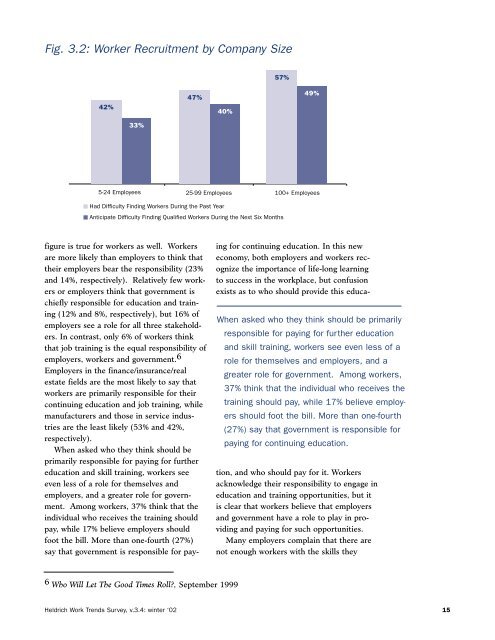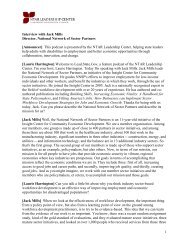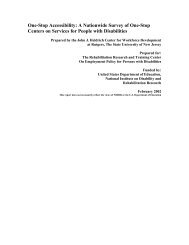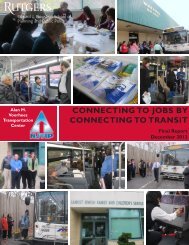Download - John J. Heldrich Center for Workforce Development ...
Download - John J. Heldrich Center for Workforce Development ...
Download - John J. Heldrich Center for Workforce Development ...
You also want an ePaper? Increase the reach of your titles
YUMPU automatically turns print PDFs into web optimized ePapers that Google loves.
Fig. 3.2: Worker Recruitment by Company Size<br />
57%<br />
42%<br />
47%<br />
40%<br />
49%<br />
33%<br />
5-24 Employees 25-99 Employees 100+ Employees<br />
Had Difficulty Finding Workers During the Past Year<br />
Anticipate Difficulty Finding Qualified Workers During the Next Six Months<br />
figure is true <strong>for</strong> workers as well. Workers<br />
are more likely than employers to think that<br />
their employers bear the responsibility (23%<br />
and 14%, respectively). Relatively few workers<br />
or employers think that government is<br />
chiefly responsible <strong>for</strong> education and training<br />
(12% and 8%, respectively), but 16% of<br />
employers see a role <strong>for</strong> all three stakeholders.<br />
In contrast, only 6% of workers think<br />
that job training is the equal responsibility of<br />
employers, workers and government. 6<br />
Employers in the finance/insurance/real<br />
estate fields are the most likely to say that<br />
workers are primarily responsible <strong>for</strong> their<br />
continuing education and job training, while<br />
manufacturers and those in service industries<br />
are the least likely (53% and 42%,<br />
respectively).<br />
When asked who they think should be<br />
primarily responsible <strong>for</strong> paying <strong>for</strong> further<br />
education and skill training, workers see<br />
even less of a role <strong>for</strong> themselves and<br />
employers, and a greater role <strong>for</strong> government.<br />
Among workers, 37% think that the<br />
individual who receives the training should<br />
pay, while 17% believe employers should<br />
foot the bill. More than one-fourth (27%)<br />
say that government is responsible <strong>for</strong> paying<br />
<strong>for</strong> continuing education. In this new<br />
economy, both employers and workers recognize<br />
the importance of life-long learning<br />
to success in the workplace, but confusion<br />
exists as to who should provide this education,<br />
and who should pay <strong>for</strong> it. Workers<br />
When asked who they think should be primarily<br />
responsible <strong>for</strong> paying <strong>for</strong> further education<br />
and skill training, workers see even less of a<br />
role <strong>for</strong> themselves and employers, and a<br />
greater role <strong>for</strong> government. Among workers,<br />
37% think that the individual who receives the<br />
training should pay, while 17% believe employers<br />
should foot the bill. More than one-fourth<br />
(27%) say that government is responsible <strong>for</strong><br />
paying <strong>for</strong> continuing education.<br />
acknowledge their responsibility to engage in<br />
education and training opportunities, but it<br />
is clear that workers believe that employers<br />
and government have a role to play in providing<br />
and paying <strong>for</strong> such opportunities.<br />
Many employers complain that there are<br />
not enough workers with the skills they<br />
6 Who Will Let The Good Times Roll?, September 1999<br />
<strong>Heldrich</strong> Work Trends Survey, v.3.4: winter ‘02 15







